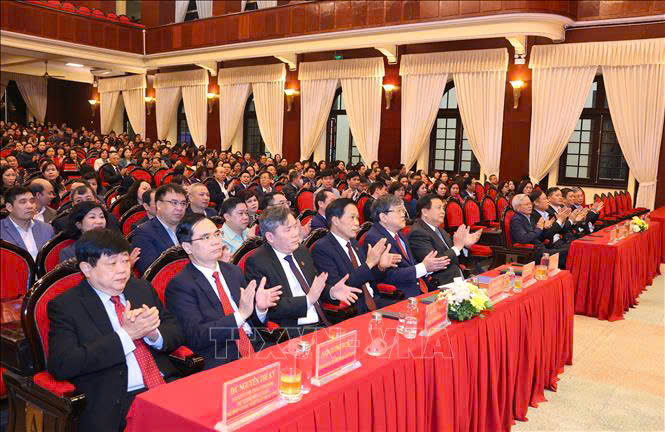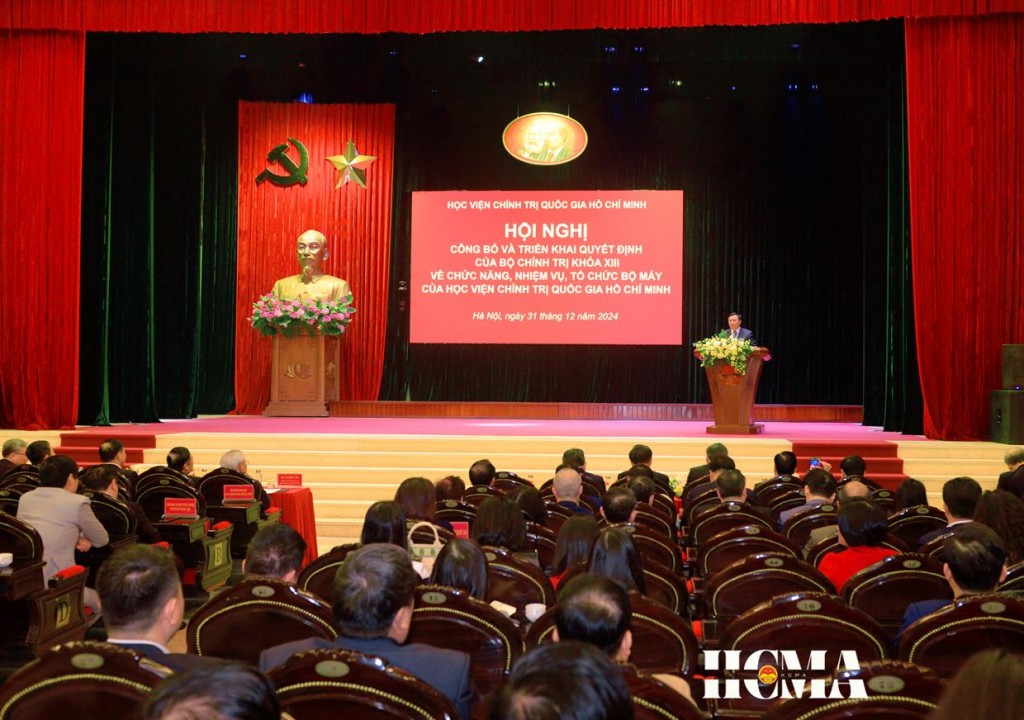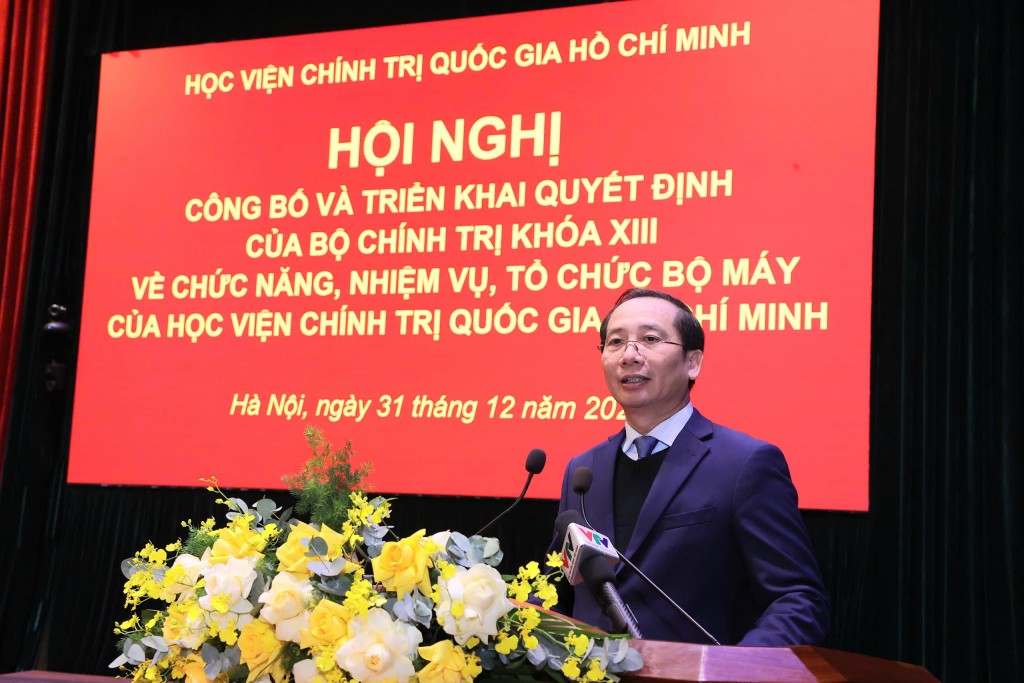On December 31, 2024, in Ha Noi, the Ho Chi Minh National Academy of Politics (HCMA) held a conference to announce and implement the Politburo’s Decision regarding the HCMA’s functions, tasks, and organizational structure. The event was conducted in person and via online connections to six locations: Academies of Politics Region I, II, III, IV, the Academy of Journalism and Communication, and the National Academy of Public Administration (before December 28, 2024).
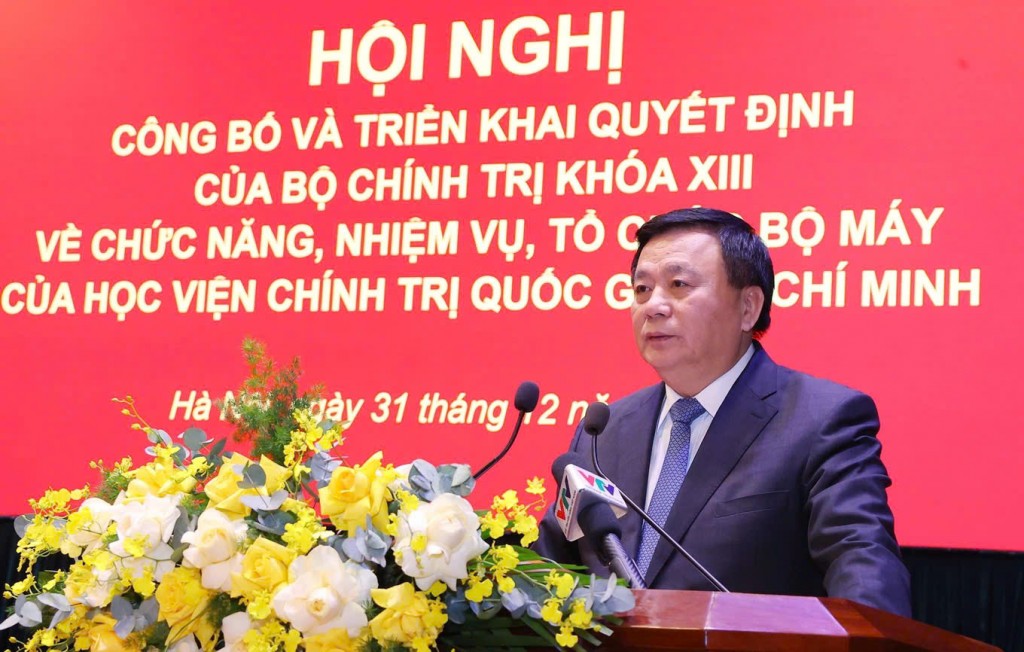
Prof. Dr. Nguyen Xuan Thang, Politburo Member, HCMA President, and Chairperson of the Central Council on Theoretical Studies, delivered the keynote address.
Prof. Dr. Nguyen Xuan Thang, Politburo Member, HCMA President, and Chairperson of the Central Council on Theoretical Studies, chaired the conference.
The conference was attended by Prof. Dr. Ta Ngoc Tan, former Member of the CPV Central Committee and Permanent Vice Chairperson of the Central Council on Theoretical Studies; other Vice Chairpersons of the Central Council on Theoretical Studies; leaders of the National Academy of Public Administration (NAPA); and members of the Council for Literary and Art Criticism.
In attendance were members of the HCMA Board of Directors, including Assoc. Prof. Dr. Nguyen Duy Bac, Deputy Secretary of the HCMA Party Committee and HCMA Standing Vice President; Assoc. Prof. Dr. Hoang Phuc Lam, Deputy Secretary of the HCMA Party Committee and HCMA Vice President; Prof. Dr. Le Van Loi, HCMA Vice President; Assoc. Prof. Dr. Duong Trung Y, HCMA Vice President; leaders of HCMA units; and all HCMA public officials.
On the side of NAPA, there were Assoc. Prof. Dr. Nguyen Ba Chien, Secretary of the NAPA Party Committee; the NAPA Board of Directors; members of the NAPA Party Committee (attending in person at Hall 1 of HCMA) and all NAPA staff (attending online at various places).
On December 28, 2024, on behalf of Politburo, the Standing Member of the Party Central Committee’s Secretariat Tram Cam Tu signed Decision No. 214-QĐ/TW regarding the functions, tasks, and organizational structure of HCMA.
According to the Decision, HCMA is the national center for training senior and mid-level leaders and managers, as well as political theory scientists of the Party, State, Viet Nam Fatherland Front, and socio-political organizations. It is also a national center for training officials, civil servants, public employees, and human resources at undergraduate and postgraduate levels. Additionally, it serves as a national research center for Marxism-Leninism, Ho Chi Minh’s ideology, theories on Party renovation, and the policies and laws of the State. HCMA also conducts research in political science, leadership science, management science, administrative science, public administration, and state management to support teaching, learning, and policy development. It contributes scientific foundations for formulating and improving the Party’s directives, policies, and the State’s laws in building and protecting the nation. Furthermore, HCMA safeguards the Party’s ideological foundation, counters erroneous and hostile viewpoints, and provides advisory services in theoretical work, cultural criticism, and the fields of literature and arts. It also coordinates and oversees scientific activities of Central Party organizations.
According to Decision No. 214-QĐ/TW dated December 28, 2024, HCMA will assume the functions and duties of several Central Councils (Central Council on Theoretical Studies, Central Council for Literary and Art Criticism, and the Scientific Council of Central Party Organizations). NAPA will also merge into HCMA, reducing the number of organizational units from 54 before the merger to 31 afterward.
Regarding its organizational structure, HCMA is headed by a President and no more than five Vice Presidents. The President is assigned by the Politburo, while the Vice Presidents are appointed by the Secretariat. The leadership of the Central Council on Theoretical Studies will include a Chairperson, who is either the HCMA President or a Party official in charge of theoretical work designated by the Politburo, and no more than five Vice Chairpersons appointed by the Secretariat upon the Chairperson’s recommendation.
Implementing the restructuring plan to streamline its organizational structure, HCMA has reduced its organizational units by 23 (from 54 to 31). Specifically:
- Nine functional departments and units: Department of Organization and Personnel; Department of Training and Refresher Training Management; Department of Academic Research Management; Department of Political Schools; Department of International Cooperation; Department of Planning and Finance; Inspectorate; Office of HCMA; Center for Technology and Digital Transformation.
- Sixteen research, teaching, information, and publication institutes: Institute of Philosophy; Institute of Political Economy; Institute of Ho Chi Minh and Party Leaders; Institute of Party History; Institute of Party Building; Institute of Socio-Economic and Environmental Studies; Institute of Politics and International Relations; Institute of State and Law; Institute of Human Rights; Institute of Culture and Development; Institute of Leadership and Public Administration; Institute of Ethnicity and Religion; Institute of Scientific Information; Journal of Political Theory; Political Theory Publishing House.
- Six affiliated academies: Academy of Politics Region I (based in Ha Noi); Academy of Politics Region II (based in Ho Chi Minh City); Academy of Politics Region III (based in Da Nang); Academy of Politics Region IV (based in Can Tho); Academy of Journalism and Communication (based in Ha Noi); Academy of Public Administration and Governance (main campus in Ha Noi, with campuses in Ho Chi Minh City and Quang Nam).
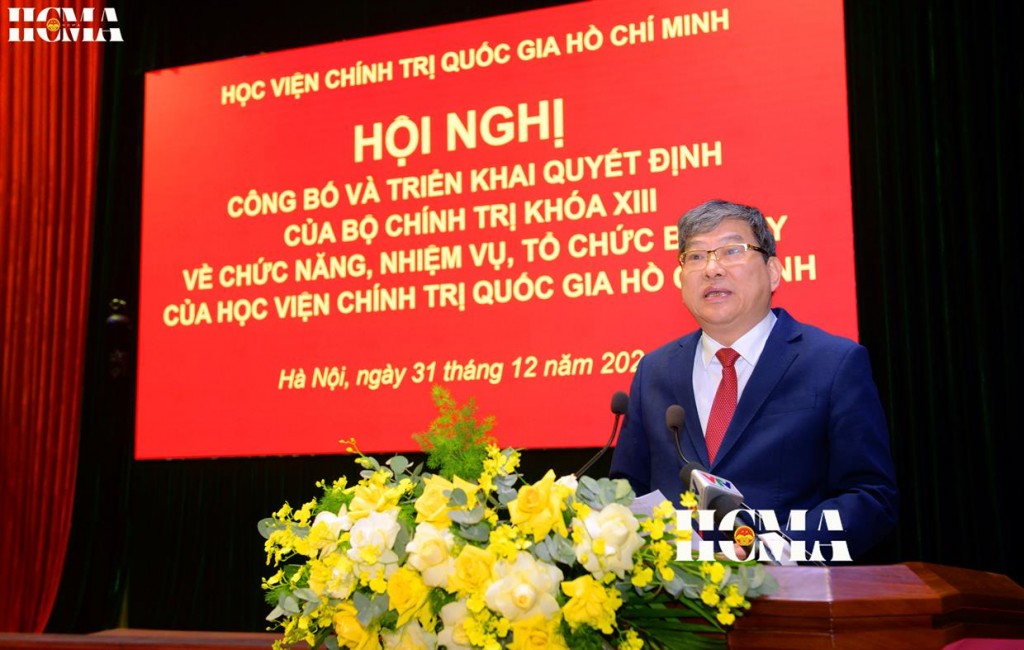
Assoc. Prof. Dr. Nguyen Duy Bac, HCMA Standing Vice President, presented the report on the development of the restructuring plan and the implementation roadmap for Decision No. 214-QĐ/TW, which defines the functions, tasks, and organizational structure of HCMA.
At the conference, Prof. Dr. Nguyen Xuan Thang stated that HCMA is among the first institutions to complete the restructuring plan, proposal, and especially the draft regulation on the functions and tasks of the streamlined and strengthened organizational structure. This ensures effective, efficient operations without overlooking any function or task, emphasizing streamlining principles within each organization and achieving high consensus.
According to him, Decision No. 214-QĐ/TW comprehensively defines the functions and tasks of HCMA following the reorganization. It elevates the HCMA’s status and scale, bringing pride and honor while presenting challenges that require each HCMA staff member, lecturer, scientist, and employee to strive harder, take greater responsibility, and adopt more effective methods to fulfill their tasks.
To effectively implement Decision No. 214-QĐ/TW, Prof. Dr. Nguyen Xuan Thang urged the HCMA’s units and newly integrated departments to ensure that ongoing tasks and responsibilities are not disrupted during the restructuring process. He emphasized the importance of fostering political thought, unity, and determination to swiftly complete the organizational restructuring to stabilize operations and achieve practical results.
He expressed confidence that, with the illustrious traditions of HCMA, NAPA, the Central Council on Theoretical Studies, and the Central Council for Literary and Art Criticism, HCMA would successfully and effectively carry out its functions and tasks in the new context. This would result in transformative changes, contributing to the nation’s new era of development.


